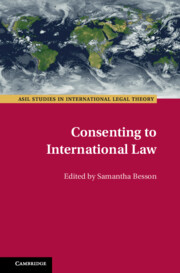Book contents
- Consenting to International Law
- ASIL Studies in International Legal Theory
- Consenting to International Law
- Copyright page
- Contents
- Contributors
- Preface
- Consenting to International Law
- Part I Notions and Roles of Consent
- 1 Consenting Is Not Willing
- 2 State Consent and the Legitimacy of International Law
- 3 Controlling Consent
- 4 International Organizations and the Disaggregation of Consent
- 5 Consenting to International Law in Five Moves
- Part II Objects and Types of Consent
- Part III Subjects and Institutions of Consent
- Index
3 - Controlling Consent
Insights from Binding Dispute Settlement
from Part I - Notions and Roles of Consent
Published online by Cambridge University Press: 23 November 2023
- Consenting to International Law
- ASIL Studies in International Legal Theory
- Consenting to International Law
- Copyright page
- Contents
- Contributors
- Preface
- Consenting to International Law
- Part I Notions and Roles of Consent
- 1 Consenting Is Not Willing
- 2 State Consent and the Legitimacy of International Law
- 3 Controlling Consent
- 4 International Organizations and the Disaggregation of Consent
- 5 Consenting to International Law in Five Moves
- Part II Objects and Types of Consent
- Part III Subjects and Institutions of Consent
- Index
Summary
The author assesses the role of consent in processes of binding dispute resolution before international courts and tribunals. He seeks to demonstrate that ‘consent’ has a particular role in binding dispute resolution. This particular role derives from the special nature of binding dispute resolution processes. They are intrusive and characterized by their uncertain outcome: the implications of State consent to the dispute resolution process crucially depend on decisions of an independent entity, namely an international court or tribunal. Because this is so, States insist on the need for consent, as a precondition of any binding dispute resolution process. At the same time, once consent has been given, control shifts to the competent international court or tribunal. Moreover, by virtue of their decision-making authority, many international courts and tribunals have managed to assert at least a persuasive influence over proper construction of the legal rules at stake, extending beyond the cases immediately pending before them. The chapter traces these peculiarities and examines how the tension between State and courts’ authority plays out in particular disputes.
Keywords
- Type
- Chapter
- Information
- Consenting to International Law , pp. 72 - 99Publisher: Cambridge University PressPrint publication year: 2023

